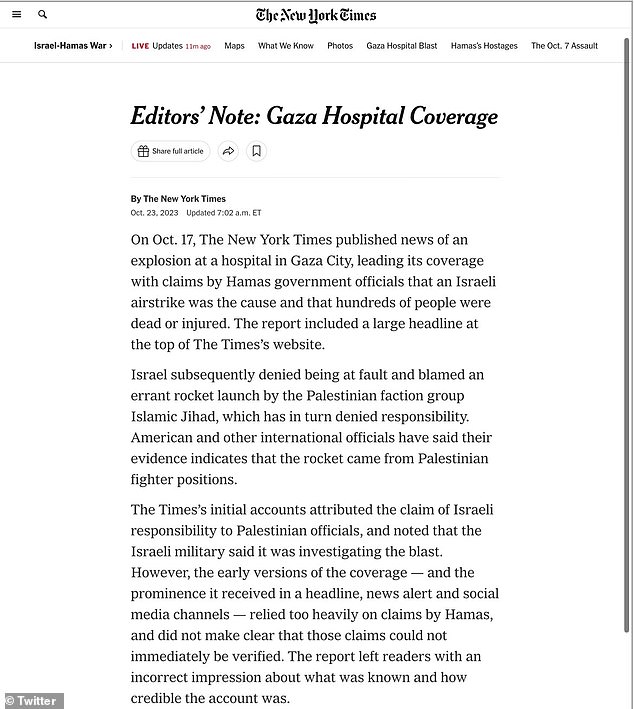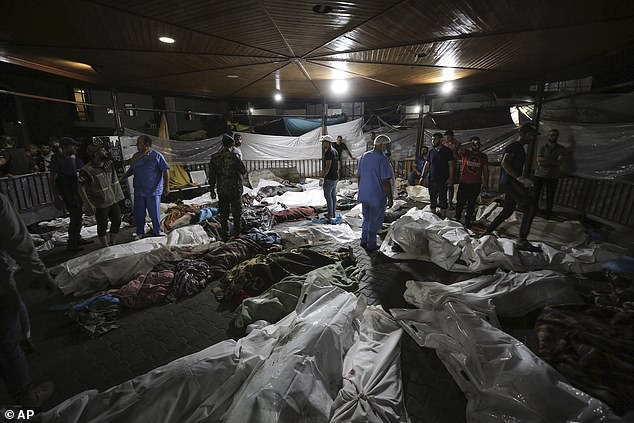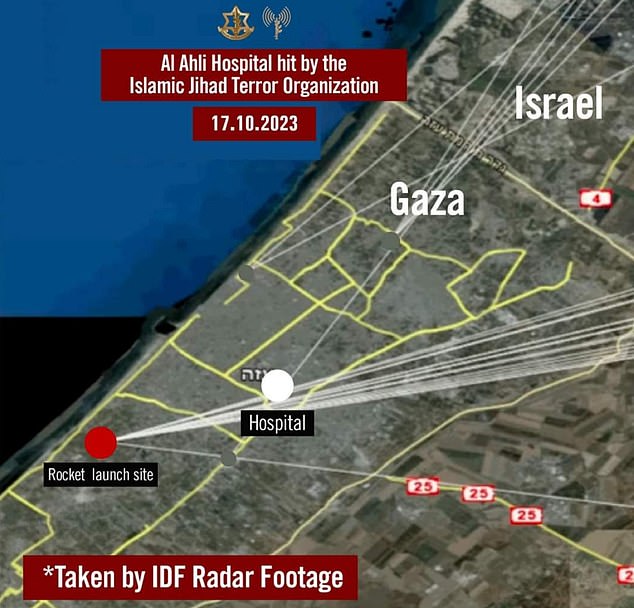New York Times publishes editors’ note admitting it ‘relied too heavily’ on Hamas claims that Israel was responsible for Gaza hospital blast
The New York Times editorial board admitted in its initial reporting that it relied too heavily on Hamas claims that Israel had bombed a hospital in Gaza, killing hundreds of people.
In a rare move, the newspaper published an editor’s note on Monday, days after a headline at the top of its website read: “Israeli attack kills hundreds in hospital, Palestinians say.”
The headline was placed above an image showing a sobbing mother carrying a child in a destroyed building – which was not Al-Ahli Hospital, where the explosion occurred.
After Israel denied it was behind the October 17 blast and more information emerged, the Times changed its headline to: “One Hundred Killed in Gaza Hospital Explosion, Palestinians Say.”
“The Times’ initial reports attributed the claim of Israeli responsibility to Palestinian officials and noted that the Israeli military said it was investigating the blast,” the editorial said.
The New York Times issued a note saying it relied “too heavily” on Hamas’ claims when it first reported last week’s blast at a Gaza hospital. This aerial photo shows people standing in front of destroyed buildings at the site of the Ahli Arab hospital in central Gaza on October 18

The outlet updated the headline several times after the original report, as seen above

“The Times’ initial reports attributed the claim of Israeli responsibility to Palestinian officials, and noted that the Israeli military said it was investigating the blast,” the note said.
“However, early versions of the reporting – and the prominence it received in headlines, news alerts and social media channels – relied too heavily on Hamas claims and did not make clear that those claims could not be immediately verified. The report gave readers an incorrect impression of what was known and how credible the story was.”
The newspaper added: ‘Given the sensitive nature of the news during a spreading conflict and the prominent promotion it received, the Times editors should have taken more care in its initial presentation and been more explicit about what information could be verified.’
Who to blame for the fiery explosion has sparked intense debate and finger-pointing between the Israeli government and Palestinian militants, further escalating tensions in their two-week war.
The AP analyzed more than a dozen videos of the moments before, during and after the hospital explosion, as well as satellite images and photos. AP’s analysis shows that the rocket that exploded in the air was fired from Palestinian territory, and that the hospital explosion was most likely caused when part of that rocket crashed to the ground.
Although the Biden administration and several news outlets such as CNN and Associated Press have concluded that the explosion came from Hamas, the NYT still reports that the origin of the rocket remains unclear.
The Times noted that Hamas officials had denied their request to visit the hospital, with one senior official claiming that “the rocket dissolved like salt in water.”
The newspaper also said Israel has rejected requests for logs of its military activities on the day of the blast.
Meanwhile, US intelligence has found that Israel was ‘probably not’ responsible for Tuesday’s explosion at al-Ahli hospital.
Officials also estimated that between 100 and 300 people were likely killed in the blast, sparking a vicious blame game between Israel, Hamas and their allies.

Bodies of Palestinians killed by an explosion at Ahli Arab hospital were gathered in the front yard of al-Shifa hospital on Tuesday

Israel also released a radar map of rocket attacks by Palestinian Islamic Jihad, as well as a video of the moment a rocket allegedly shooting from Gaza toward Israel appears to have a problem and suddenly changes course before burning out.
“Israel probably did not bomb the hospital in the Gaza Strip: we believe that Israel was not responsible for an explosion that killed hundreds of civilians yesterday (October 17) at the Al Ahli hospital in the Gaza Strip,” the verdict reads. from CNN.
“Our assessment is based on available reporting, including intelligence, missile activity and open-source video and images of the incident,” it added.
According to the assessment, the intelligence community “observed only minor structural damage at the hospital,” with no observable damage to the main hospital building and no impact craters.
“We see only minor damage to the roofs of two buildings near the main hospital building, but both structures remained intact,” the assessment said.
The US intelligence community on Wednesday released its first assessment that Israel was not responsible, after President Joe Biden publicly stated in Israel that the attack “appeared to be the result of an errant rocket fired by a terrorist group in Gaza.”
It came as one European intelligence agency told AFP: “There were not 200 or even 500 deaths, more likely between 10 and 50.”
The Israeli military shared a raft of evidence that it said proved that a misfired rocket fired by the Palestinian Islamic Jihad (PIJ), an independent jihadist group, was behind the blast.
The evidence provided by the IDF included an audio clip from suspected Hamas terrorists confirming that the rocket came from PIJ, a video of what appears to be the rocket in question misfiring over Gaza, and bird’s-eye view of the explosion site that did not show showed consistent characteristics. with an Israeli airstrike, an IDF spokesman said.
Meanwhile, Israel’s enemies – Hamas, PIJ, Hezbollah and Iran – insist the IDF was behind the destruction and vowed to take revenge. Anger arose in the Muslim world, with demonstrators taking to the streets in cities from Tripoli to Tehran in a demonstration against Israel.
The Jordanian Foreign Minister said: ‘No one buys the Israel story in this part of the world… the only way people would entertain a different story is if there is an independent international investigation with impeccable evidence that it was not Israel .’
However, several experts and analysts working on the issue appear to largely agree with Israel’s assessment that a misfired rocket fired from Gaza caused the tragedy, but many cautioned that it was too early to say for sure .
